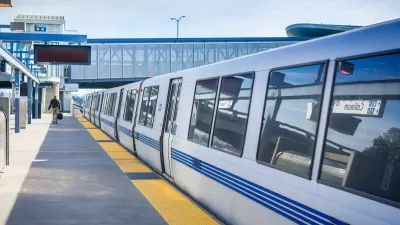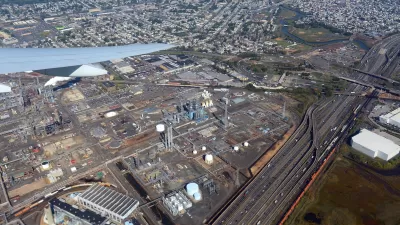Under new state regulations, Colorado transportation projects will be required to reduce GHG emissions and promote more sustainable transportation modes.

New rules from the Colorado Transportation Commission will shift the state's focus from road construction to more sustainable modes of transit in an effort to reduce greenhouse gas emissions. An article by Noelle Phillips and Jon Murray outlines the new regulations, which transportation commissioner Kathleen Bracke called a "critically important milestone." Starting February 14, future projects will be required to assess the impact of new projects on emissions and switch to cleaner alternatives if the projections surpass a set limit. "The Department of Transportation’s commissioners hope the new rules build on the state’s push to put more electric vehicles on the road while improving mass transit, biking and walking options."
The rules received pushback from critics who worry that rural, car-dependent areas could suffer disproportionately from reduced transportation funding. Business groups and some local leaders in Colorado's burgeoning Northern Front Range region claim that the rapid growth of their communities indicates a need for roadway expansions, arguing that the Commission is overstepping its legal authority.
Meanwhile, environmental groups say the regulations don't go far enough to make the drastic reductions in emissions needed to mitigate the effects of climate change and air pollution. While the state has pledged to get one million electric vehicles on its roads by 2030, environmentalists say the benefits won't accrue fast enough.

Alabama: Trump Terminates Settlements for Black Communities Harmed By Raw Sewage
Trump deemed the landmark civil rights agreement “illegal DEI and environmental justice policy.”

Planetizen Federal Action Tracker
A weekly monitor of how Trump’s orders and actions are impacting planners and planning in America.

The 120 Year Old Tiny Home Villages That Sheltered San Francisco’s Earthquake Refugees
More than a century ago, San Francisco mobilized to house thousands of residents displaced by the 1906 earthquake. Could their strategy offer a model for the present?

Opinion: California’s SB 79 Would Improve Housing Affordability and Transit Access
A proposed bill would legalize transit-oriented development statewide.

Record Temperatures Prompt Push for Environmental Justice Bills
Nevada legislators are proposing laws that would mandate heat mitigation measures to protect residents from the impacts of extreme heat.

Downtown Pittsburgh Set to Gain 1,300 New Housing Units
Pittsburgh’s office buildings, many of which date back to the early 20th century, are prime candidates for conversion to housing.
Urban Design for Planners 1: Software Tools
This six-course series explores essential urban design concepts using open source software and equips planners with the tools they need to participate fully in the urban design process.
Planning for Universal Design
Learn the tools for implementing Universal Design in planning regulations.
Clanton & Associates, Inc.
Jessamine County Fiscal Court
Institute for Housing and Urban Development Studies (IHS)
City of Grandview
Harvard GSD Executive Education
Toledo-Lucas County Plan Commissions
Salt Lake City
NYU Wagner Graduate School of Public Service





























